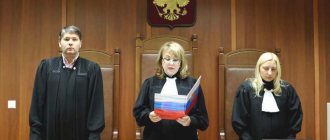Not all citizens manage to pay utility bills accurately. There are good reasons for this. However, if payments are delayed for more than 1-3-6 months, penalties may be charged and hot water, gas, and electricity may be turned off. And also through the court, the housing management organization collects the debt. And then the bailiffs will seize money and property. In some cases, the debtor may even be evicted from the apartment.
Read about all the consequences of having debt and how to avoid sanctions further in the article. If you have any questions, write in the comments
Liability for non-payment
If payment for housing and communal services is overdue by more than one month, what threats will arise?
Penalties will be charged on the main payment
Penalties begin to accrue from the second month of delay. The rights of public utilities to their accrual are reflected in paragraph 14 of Article 155 of the Housing Code. The penalty is accrued for each day and its % changes depending on the number of months of non-payment:
- 1/300 of the refinancing rate of the Central Bank of the Russian Federation - starting from 2 months to 3 months
- progressive penalty 1/130 for subsequent ones, starting from 4 months.
Amount of penalty = debt * number of days of delay * 1/300 * refinancing rate. The current rate can be found on the Central Bank website www.cbr.ru. From the beginning of 2021, the rate is 4.25%.
Example: The total amount of debt for services as of March 10, 2021 is 2,400 rubles. Of these, 1200 rubles. for February, and 1200 rubles. for January 2021. You made the payment only on March 20, 2021 (the number of days of delay is 10).
Calculation of penalties: (1200*10 days/300)*4.25%=1.70 rubles.
Disabling the use of utilities
Temporary restriction or disconnection from the use of utilities (gas, electricity, hot water, intercom services) until the debt is repaid. The debtor faces this measure if the rent debt is more than three months.
The procedure for applying the restriction:
- the debtor is notified in person or in writing (by post);
- if the debtor ignores the notification, the contractor personally notifies the consumer after 3 days and disconnects when technically possible.
What utilities cannot be turned off?
- heating;
- cold water supply.
Accordingly, electricity, gas, hot water may be turned off, and sewerage may be closed.
Utility services are resumed no later than 2 days after payment of the debt for services. Or after signing an agreement on debt restructuring (see what to do if the electricity or gas is turned off).
Submitting a debt collection case to court
Utility companies are free to start a lawsuit to collect housing and communal services debt from the moment they are convinced that the user has stopped making payments. To start:
- the debtor is notified of the debt in person or in writing (see how to find out the rent debt);
- offer to pay the debt voluntarily within 30 days or enter into an agreement to repay the debt;
- in case of refusal or non-payment, a package of documents is prepared and sent to the court. From June 1, 2021, the procedure for collecting debt for housing and communal services has been simplified. Now, when submitting documents to the court, a positive decision is made in absentia within 5 days according to a court order.
The cost of the claim may increase significantly, since it will include not only the total amount of the entire debt, penalties for the entire period of delay, but also legal costs.
It is impossible to present the amount of penalties for the period of the moratorium introduced by RF PP No. 424
The ban on collecting penalties and fines for late payments for housing and communal services was in effect from April 6, 2021 to January 1, 2021. It was introduced by Decree of the Government of the Russian Federation dated 04/02/2020 No. 424. The moratorium applied to consumers and persons managing houses: management entities, homeowners' associations and cooperatives.
On April 30, 2021, a review of the Supreme Court of the Russian Federation No. 2 appeared on the application of regulations related to the fight against coronavirus, including a moratorium on penalties due to citizens’ failure to pay utility bills:
- The ban on penalties is valid until January 1, 2021 inclusive, therefore, the calculation of penalties begins on January 2.
- For the entire period of the moratorium, no penalty can be charged or collected.
As Elena Shereshovets noted, it does not matter that the period of prohibition of RF PP No. 424 on penalties for debts has already ended: for late payments from April 6 to January 1, 2021, it will never be possible to present the amount of penalties to debtors.
The expert has compiled a rating of creative measures to combat debts for housing and communal services
Methods for collecting debt after a court decision has entered into force
Voluntary order
The debtor may be asked to pay the debt in full at one time, or to enter into an agreement on debt restructuring (usually concluded for a period of 6 months, but can be extended). This agreement is the most advantageous option, since it allows you to pay off the debt over a certain period, in equal shares, and not the entire amount at once. The restructuring agreement form is drawn up by utility companies based on the application you submit.
Sample application for debt restructuring for housing and communal services
To the head of Management Company "Zarya" Antonov A.S. from Yakimov S.T. residential address: Mirny, st. Soyuzov 31-2 tel. 34-37-21
Statement
I ask you to consider concluding an agreement with me on restructuring the debt for the use of services (specify the type of service: heating, sewerage, water supply) for residential premises owned by me, located at the address: Mirny, st. Unions 31-2.
As of March 1, 2021, the debt is 46,341 rubles. My last payment was made in October 2021.
The reason for the lack of payment is layoff from work, difficult financial situation.
Date__________ Signature_______________
Compulsory order - with the help of bailiffs
Collection by a bailiff can be made from funds from:
- working-age population: by sending a writ of execution to the place of work (main or part-time);
- pensioners: by seizing pensions and other income;
- disabled people: debt for housing and communal services can be recovered from a disability pension, except in cases where the person is deprived of legal capacity.
Important! The amount of monthly deductions from earnings or other income cannot be more than 50% of the total monthly income.
Other measures most often used by bailiffs:
- seizure of property (including money, securities, current accounts, property in the apartment);
- seizure of seized property and sale at auction;
- introduction of restrictions on leaving the Russian Federation;
- introduction of restrictions on registration actions with property.
See what the bailiff can take away, how to find out the debt from the bailiff by last name.
Consequences of failure to fulfill an obligation
The law provides for the following types of punishment for failure to fulfill this obligation:
- for each day of delay in payment, a penalty is charged (Article 155 of the Housing Code [1]);
- for late payment, the home is disconnected from services (Government Decree No. 354, paragraph 114[2]);
- when the amount of debt is too large, the management company can collect the entire debt with the addition of a fine in court under Civil Procedure Code Article 3[3];
- the person is also brought to administrative responsibility of the Code of Administrative Offenses, Article 3.5[4] for failure to pay rent on time;
- In addition to all this, the defaulter can be evicted from an apartment or house on the basis of Article 83 of the Housing Code[5].
These are not all the consequences that non-payment of housing and communal services causes. In some cases, the homeowner may also be subject to criminal liability.
Forced eviction for utility debts
Can they be evicted from an apartment for a utility debt? Eviction for debt is a separate requirement of the statement of claim by representatives of the utility service. If, after the court decision comes into effect, the debtor continues to accumulate debt, does not comply with the requirements of the restructuring agreement, and the FSSP of the Russian Federation fails to collect anything from him, the time comes for this extreme measure - eviction.
Eviction procedure:
- written notification to the debtor about the possible application of eviction proceedings;
- filing a claim in court for the forced eviction of the debtor;
- After the court's decision, the person will be given 7 days to voluntarily evict, and then a compulsory order will be carried out.
Eviction from a privatized apartment
If a person has other suitable housing, he may be evicted for debt. This implies that the apartment will be seized and then sold at auction. That is, the debtor will be deprived of his property. The owner's right is protected here by Art. 446 Code of Civil Procedure of the Russian Federation. It says that in the absence of other suitable housing, foreclosure on the only housing is prohibited. And a person cannot be evicted to a hostel or social housing. Bailiffs have the right to seize, describe, and then sell at auction any property in the debtor’s apartment, and that which belongs to him personally.
An important point: if the debt is small, then they will not be able to repossess the apartment. Since the debt must be commensurate with the repossessed housing. There must be debts of up to a million rubles. So such cases are rare.
Eviction from a municipal apartment
The possibility of eviction from municipal housing is provided for in Art. 90 LC RF under the following circumstances:
- the debt for housing and communal services is more than six months, and the reason for lack of payment is not valid (loss of job, serious illness requiring treatment costs, loss of a close relative (funeral costs), compensation for material damage according to writs of execution);
- provision of other housing on social rent, meeting the requirements for living space and sanitary standards.
- The responsible tenant (with whom the contract is concluded), as well as members of his family, are subject to eviction.
As a result, the social rent agreement is terminated through the court and the person ends up on the street.
Eviction from the hostel
The rental agreement under which a citizen lives in a hostel is signed for a certain period (for the duration of work, study, service). The owner of the hostel can be an organization or municipality. The rights and obligations of the tenant under such an agreement coincide with the social tenancy agreement. Therefore, the landlord has the right to evict the debtor for debts that have arisen for more than six months (clause 1, part 4, article 83 of the Housing Code of the Russian Federation), without providing other housing. But after the court decision.
About the accrual of penalties
The legislation of the Russian Federation specifically provides for the accrual of appropriate penalties for non-fulfillment or untimely fulfillment of a citizen’s financial obligations. Moreover, in case of non-payment of utilities, a penalty is also charged on the total amount of the debt.
At the same time, for different periods of delay, the corresponding penalties are assigned in different amounts:
- from the 31st to the 90th day of the current debt for housing and communal services, the penalty amount is 1/300 of the refinancing rate, which is established by the Central Bank of the Russian Federation;
- from the 91st day of overdue debt, the amount of the accrued penalty is already 1/130 of the Central Bank refinancing rate.
The penalties themselves are assigned to the entire total amount of debt for each day of late payment. That is, unfair and untimely payment of tariffs for housing and communal services regularly aggravates the financial situation of a citizen, and subsequently only further increases the amount of his debt. Today the key rate of the Bank of Russia is 8.25%.
Joint and several liability for utility debts
How to collect debt from citizens living with the owner or responsible tenant under a rental or social tenancy agreement? If it is impossible for the tenant (owner) to pay for utilities, the plaintiff (representative of the resource supply organization) has the right to collect the debt from any of the legally capable persons living with him. This is called joint liability.
Liability is provided for all persons if:
- the apartment is owned. The owner cannot or does not want to voluntarily repay the debt with his own funds. The law obliges the debt to be repaid by other capable family members living with the owner (spouse, children, parents, other persons occupying the premises with the consent of the owner) Art. 31 Housing Code of the Russian Federation.
- the apartment is in shared ownership. The obligation to pay rests with each owner individually. This is done by separating personal accounts with the conclusion of maintenance and repair agreements for each owner.
- residential premises are occupied by persons under a rental agreement. Members of the tenant's family are subject to similar obligations to pay for the use of services, that is, joint and several liability under the terms of the rental agreement. Persons living together with the tenant must be indicated when concluding the contract (Article 69 of the Housing Code of the Russian Federation).
Limitation period for utility debts
As a general rule, the statute of limitations allowed for collecting debt for housing and communal services is three years . Judicial practice shows that such claims are satisfied by the court, and bailiffs with their actions can darken the life of the debtor for an even longer period. Therefore, it is better to pay off debts immediately than to accumulate them.
- Housing Code of the Russian Federation Article 83. Termination and termination of a social tenancy agreement for residential premises
- Housing Code of the Russian Federation Article 90. Eviction of the tenant and his family members living with him from residential premises with the provision of another residential premises under a social tenancy agreement
- Code of Civil Procedure of the Russian Federation Article 126. Procedure for issuing a court order
- Housing Code of the Russian Federation Part 14, 14.1 Article 155. Payment for residential premises and utilities
There's nowhere else to go
The Ministry of Construction was proposed to extend the moratorium on the payment of penalties and fines for housing and communal services in 2021, Izvestia wrote earlier. However, this should not be done, experts interviewed by Izvestia unanimously believe.
— When the moratorium was introduced, people did not understand how to behave during isolation, what the situation would be like at work, and so on. Some citizens paid utility bills offline. But now everyone who wanted to has already mastered payments on the Internet, volunteers are helping the elderly,” emphasized Irina Bulgakova, chair of the expert council of the State Duma Committee on Housing Policy and Housing and Communal Services.
Oh, you're fine
Photo: TASS/Vladimir Smirnov
Only unscrupulous citizens do not pay, she added. An endless extension of the moratorium could lead to the country’s housing and communal services system suffering irreparable losses, Sergei Minko pointed out. In particular, as Izvestia wrote, in some cities the collection of utility bills from March to June decreased from 90% to 60%.
Payments are not painted: the volume of debts for housing and communal services may increase by one and a half times
This will be caused by the management company’s lack of ability to collect overdue amounts through the court, industry officials believe









